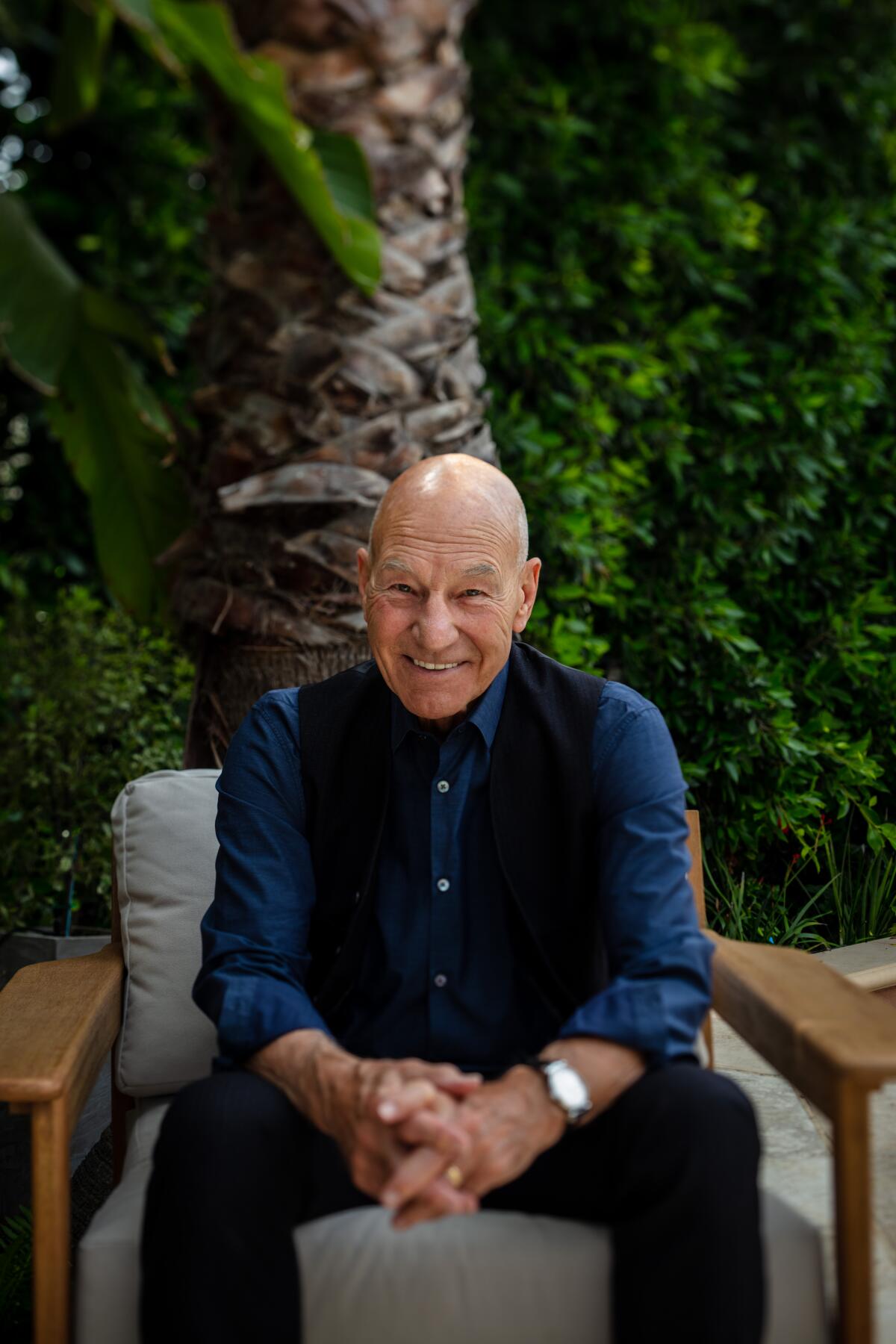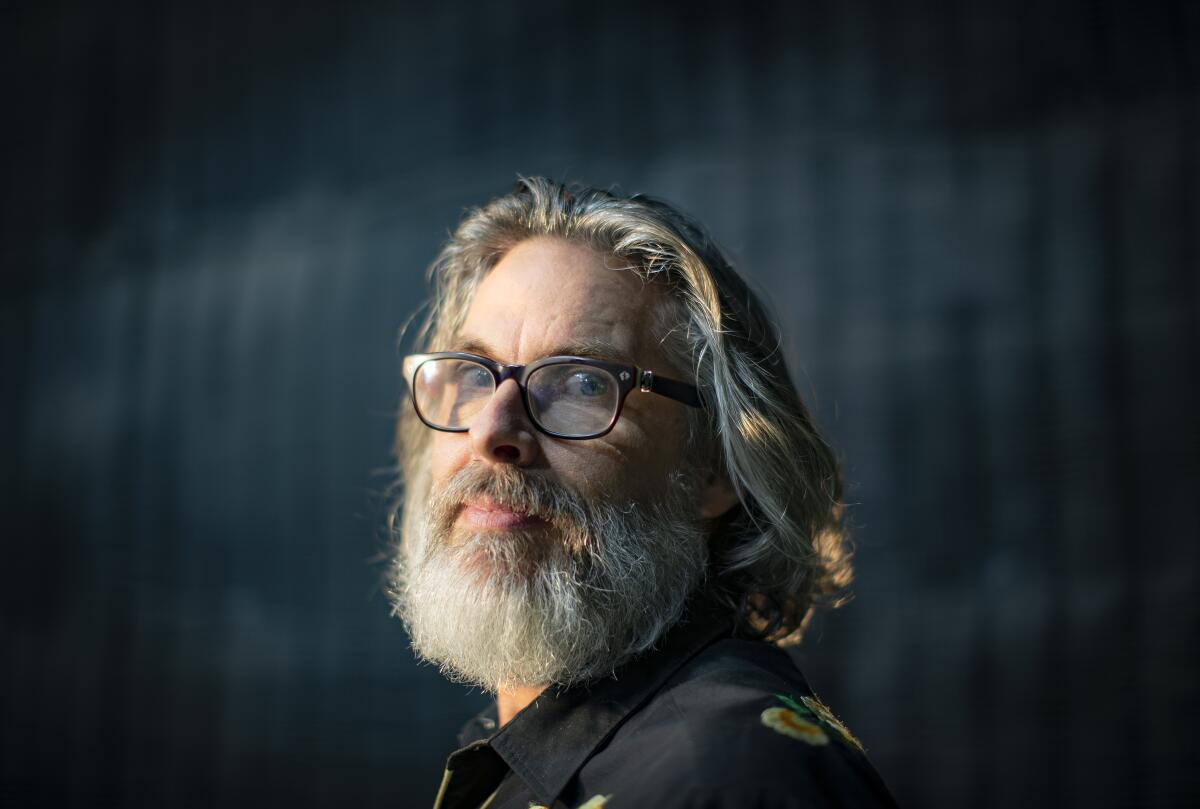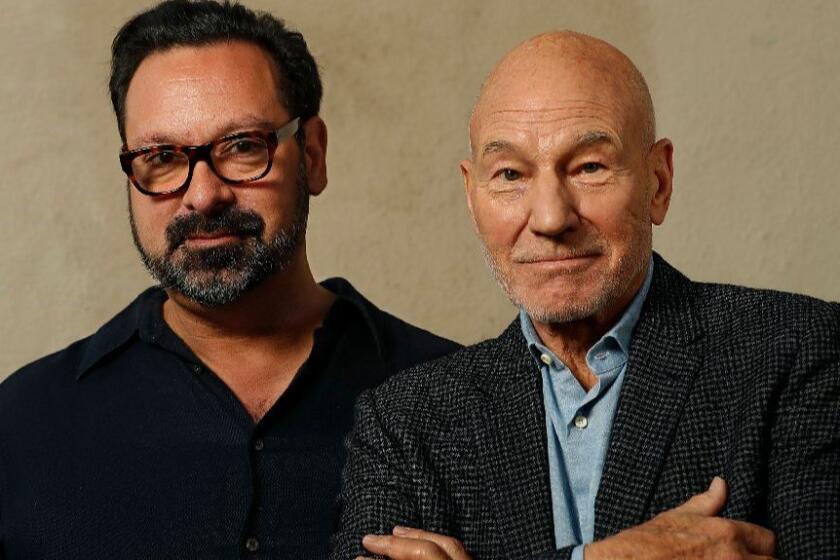How novelist Michael Chabon lured Patrick Stewart back to the ‘Star Trek’ universe

- Share via
Longtime “Star Trek” fans can skip ahead. For those a little newer to the vast “Trek” canon, which has gone boldly etc. etc. since 1966, here’s a summary: As Captain (later Admiral) Jean-Luc Picard, Patrick Stewart helmed the Enterprise on “Star Trek: The Next Generation” from 1987 to 1994 (and in multiple feature films), becoming one of the franchise’s most beloved characters. Michael Chabon, who cocreated CBS All Access’ “Star Trek: Picard” this year, is a Pulitzer Prize-winning author and TV newbie but a lifelong “Trek” fan.
The Envelope transported them to the Zoom universe to find out how it felt to send Picard back into space — while also altering him entirely.

Trailer for “Star Trek: Picard” Season 1 on CBS All Access.
How familiar were each of you with the other before you worked together?
Chabon: Patrick first made an impression on me when he turned up on “Next Generation,” and I said, “Oh, it’s that guy from ‘Dune.’” I love watching him work. Getting to see him do this role before my eyes is unquestionably one of the high points of my life.
Stewart: I had never read a word Michael had written. But since then, I have made up for lost time. Michael is a truly collaborative individual, which I didn’t necessarily expect. I’ve been doing a bit of writing myself recently and it is a deliciously exclusive experience — all there is is me and the keyboard and what’s inside my head. I’m beginning to love it, Michael, so you better watch out.
The Pulitzer-winning ‘Adventures of Kavalier & Clay’ novelist talks about his new job: showrunner on CBS All Access’ ‘Star Trek: Picard.’
What convinced you both to sign on?
Chabon: When they asked me to join, they were like, “We’re trying to get Patrick Stewart to come back and do Picard.” There was a bit of discouragement from Patrick Stewart’s side, and it seemed like the ship might be sailing. So I wrote this long document … that got sent to Patrick.
Stewart: I felt that the curtain had come down on Jean-Luc Picard after 178 television episodes and four feature films. [“Picard” co-creators Alex Kurtzman, Kirsten Beyer and Akiva Goldsman] said there might be something more to say about him in an environment that was very different from “Next Generation.” And they talked and talked and that’s when I said, “Could you please put as much of that as possible on paper so that I can study it properly?” That’s when I encountered Michael.

Chabon: The only thing I remember [about those pages] was that it started with Picard having long since retired, and was now a jack of all trades. When the story opened up he was working as a road manager for a traveling theater company, and we were doing a performance of Samuel Beckett’s “Krapp’s Last Tape.”
Stewart: Don’t you think there should have been Beckett on “Star Trek,” after all those seasons?
As I understand it, Patrick, your role in 2017’s “Logan” — the last time you played Professor Charles Xavier — actively shaped Picard this time.
Stewart: In that film, Charles Xavier was no longer the wise, thoughtful, modest, humorous gentle man [he’d been]; he was a crazy, dangerous fellow … screaming out children’s nursery rhymes. I just love that. I introduced this idea [to the “Picard” team] to say, “I do not want you to rewrite ‘Logan.’ But the reason I made ‘Logan’ was to expose aspects of Charles Xavier that had never been seen before.” And this is exactly what Michael and the team have been doing with Jean-Luc.
“Even superheroes grow old,” says James Mangold, director and co-writer of “Logan.”
Chabon: It would be really easy for me personally to write a “Next Generation” episode. That would be fun in an eating-a-whole-bag-of-chips way. But to test your knowledge and understanding, by taking the character you know so well and putting that character in a totally different context, is such a great creative challenge. It forces you to look closely at … the character of “Star Trek.”
How so?
Chabon: The rap on “Star Trek” is it’s utopian, optimistic. Over the years, a lot of these things have been tossed out by writers, like, “Yes, we don’t have money” and “Yes, we don’t have war” and all these admirable things, but we aspired to say, “What does that actually mean?” What does it mean that Jean-Luc Picard owns a winery? This is a 50-plus-year-old machine where people haven’t dug around inside too much.
Stewart: Michael, you also introduced emotional disturbances in Picard which had not been present before … like his experience as a partially assimilated [cybernetic organism] Borg. There was no real residue from it. But there has to have been. What has it been like for the past 25 years, having gone through that incredibly traumatic experience and never having had the chance to talk about it or reckon with it or purge it?
It was 50 years ago that “Star Trek” died.
What did you both learn from Season 1 that you’ll apply in Season 2 to continue making this a rich story and character experience?
Chabon: The first season of “Picard,” especially the first half, was about learning how to make “Picard.”
Stewart: There was no socializing [between the actors] for the first five months — we were shooting. When we came to the end of the series, we had promotional activities to engage with and we were traveling together on airplanes and got to know one another so much better. This is going to be a new element in Season 2, that there is a lot of mutual respect everywhere. If you know you can take risks, and there is a network around you that if you crash land, they will catch you, it’s a wonderful feeling. That’s how I feel now. I feel safe.

Cast members of “Star Trek: Discovery” and “Star Trek: Short Treks” chat with the L.A. Times at San Diego Comic-Con 2019.
More to Read
The complete guide to home viewing
Get Screen Gab for everything about the TV shows and streaming movies everyone’s talking about.
You may occasionally receive promotional content from the Los Angeles Times.








